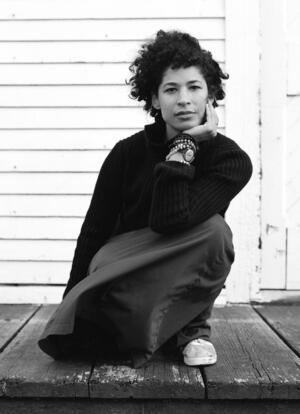Rebecca Walker Is Born
Katy Ronkin
Born on November 17, 1969, to famed African-American writer Alice Walker and Jewish-American civil rights lawyer Mel Leventhal, Rebecca Walker has achieved international recognition for her writings on feminism, motherhood, and multiracial identity, and for her contributions to feminist thought. Walker is considered one of the founders of third-wave feminism after coining the term “thirdwave” in a 1992 essay for Ms. Magazine entitled “Becoming the Third Wave.” Emerging in the mid-1990s, third-wave feminism encouraged women to embrace their sexuality and dismantle power structures instead of working toward reform. It also aspired to be far more inclusive of women of color than feminist movements of the past. Walker's essay details the need for a third wave of feminism in response to the misogyny she witnessed watching the Anita Hill hearings. Walker then co-founded the Third Wave Fund, whose mission was to “fill a void in young women’s leadership and to mobilize young people to become more involved socially and politically in their communities.”
Walker has received many awards and accolades for her writing over the years. A New York Times bestseller, her memoir, Black, White, and Jewish, reflects upon her confusion growing up as a Jewish biracial woman in America. After Walker’s parents split, she alternated between living with her father on the East coast and her mother on the West. In her memoir, Walker recounts the difficulties of navigating the two worlds and is unable to reconcile her many identities. She also touches upon what she identified as neglect by her parents, which only served to magnify her struggle to feel like she belonged.
Walker also edited an anthology exploring modern feminism called To Be Real: Telling the Truth and Changing the Face of Feminism, which remains a staple in women’s studies courses across the United States. Her other writings include What Makes a Man, an anthology exploring modern masculinity, and Baby Love, a memoir in which she documents her pregnancy and struggles to reconcile her desire to be a mother with the ambivalence promoted by second-wave feminism.
A celebrated speaker, Walker has educated hundreds of audiences on the power of memoir and using journaling to make life changes. Walker is also involved in entertainment as a film and television producer and a writer on the Amazon Prime comedy, One Mississippi. Walker was named by Time magazine as one of the 50 most influential leaders of her generation and has received the Women Who Could Be President Award from the League of Women Voters.
Sources
"About". Accessed August 5, 2020.; "Rebecca". Writing in Paradise. Accessed August 5, 2020.; "Black White and Jewish: Autobiography of a Shifting Self". Amazon. Last modified 2020. Accessed August 5, 2020.; Brunell, Laura, and Elinor Burkett. "Feminism." Encyclopaedia Britannica. Last modified March 5, 2020.; "Handout 1, Rebecca Walker, 'I Am the Third Wave.'" Teach Rock. Accessed August 5, 2020.; Heywood, Leslie. The Women's Movement Today: An Encyclopedia of Third-wave Feminism: A - Z. Westport: Greenwood, 2006. Accessed August 5, 2020.; Kveller Staff, and Molly Tolsky. "Five Minutes with Rebecca Walker." Kveller. Accessed August 5, 2020.; Penguin Random House. "Rebecca Walker." Penguin Random House. Last modified 2020. Accessed August 5, 2020.; Temple, Colleen. "Q&A with Bestselling Author Rebecca Walker on Motherhood, Identity + Courage." Motherly. Accessed August 5, 2020.; Third Wave Fund. Accessed August 5, 2020.




Before Rebecca's parents split she attended the elementary school where I was a teacher. The school was in Brooklyn and I recall her father bringing her to school in the morning. At the time I had no idea who her parents were and how amazing they both are.